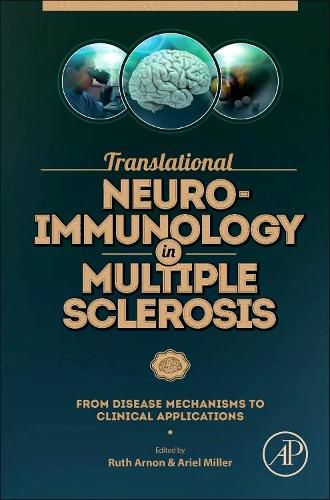Readings Newsletter
Become a Readings Member to make your shopping experience even easier.
Sign in or sign up for free!
You’re not far away from qualifying for FREE standard shipping within Australia
You’ve qualified for FREE standard shipping within Australia
The cart is loading…






Multiple sclerosis (MS) is the most common disabling neurological disease of young adults. More than 2.3 million people are affected by MS worldwide. Symptoms can vary widely, depending on the localization and amount of the damage induced by combined inflammatory, demyelinating, and neurodegenerative processes. Although a cure for MS does not currently exist, therapies can help treat MS attacks, attenuate disease activity, reduce progress of the disease, and manage symptoms.
Translational Neuroimmunology in Multiple Sclerosis provides an overview of recent findings and knowledge of the neuroimmunology of multiple sclerosis, from experimental models and the human disease to the translation of this research to immunotherapeutic strategies. Chapters describe genetic and environmental factors underlying the disease pathogenesis of MS as a basis for development of immunotherapies, immunological markers of disease activity, pharmacogenetics, and responses to therapy. Immunomodulatory therapies currently in practice and future therapeutic strategies on the horizon-such as neuroprotective strategies, stem cells, and repair promotion-are discussed. Contributed by renowned leaders in the field, this cross-disciplinary volume is a great resource for basic scientists and clinical practitioners in neuroscience, neurology, immunology, pharmacology, and in-drug development.
$9.00 standard shipping within Australia
FREE standard shipping within Australia for orders over $100.00
Express & International shipping calculated at checkout
Multiple sclerosis (MS) is the most common disabling neurological disease of young adults. More than 2.3 million people are affected by MS worldwide. Symptoms can vary widely, depending on the localization and amount of the damage induced by combined inflammatory, demyelinating, and neurodegenerative processes. Although a cure for MS does not currently exist, therapies can help treat MS attacks, attenuate disease activity, reduce progress of the disease, and manage symptoms.
Translational Neuroimmunology in Multiple Sclerosis provides an overview of recent findings and knowledge of the neuroimmunology of multiple sclerosis, from experimental models and the human disease to the translation of this research to immunotherapeutic strategies. Chapters describe genetic and environmental factors underlying the disease pathogenesis of MS as a basis for development of immunotherapies, immunological markers of disease activity, pharmacogenetics, and responses to therapy. Immunomodulatory therapies currently in practice and future therapeutic strategies on the horizon-such as neuroprotective strategies, stem cells, and repair promotion-are discussed. Contributed by renowned leaders in the field, this cross-disciplinary volume is a great resource for basic scientists and clinical practitioners in neuroscience, neurology, immunology, pharmacology, and in-drug development.